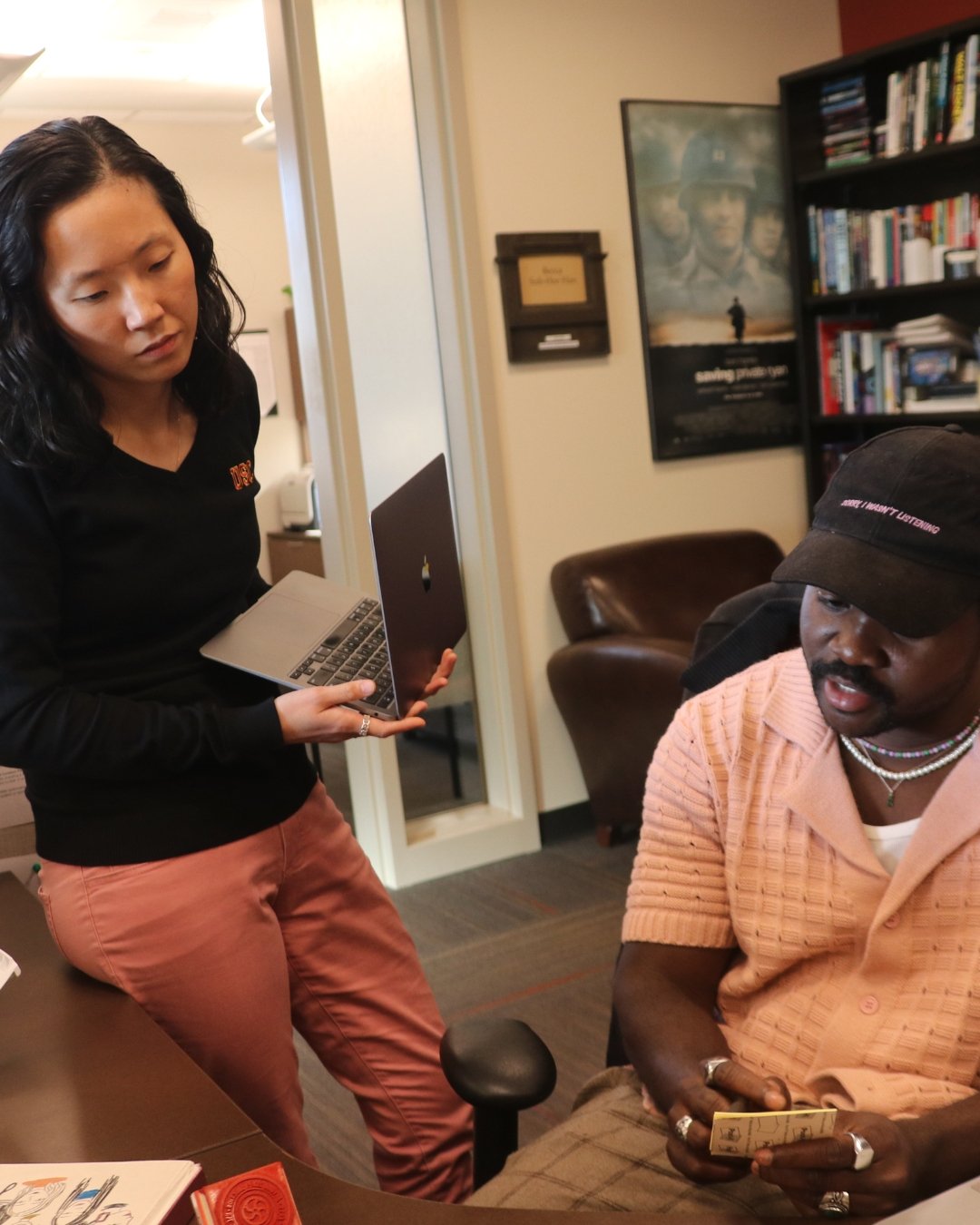Caption: (L-R) Suh-Hee (Becca) Han (Physical Production Administrator), Hashem Selph (Director of Physical Production), and Jared Mayerson (Physical Production Coordinator)
Expanding On the Idea of “Safety” at the Physical Production Office
by Hugh Hart
Last spring, a student filmmaker kicked off his rom-com script with a startling scenario: The lead character wakes up to find he's been buried alive. It's dramatic, for sure, but what about safety? That's where SCA's Physical Production Office stepped in. "It's kind of like a romantic comedy, but the whole film structures itself around this person in the ground," explains Physical Production Administrator Suh-Hee (Becca) Han. "I think the director figured, 'They're going to say no,' but we ended up having a meeting with faculty and the trio [of filmmakers] where they gave us their shooting plan." The solution? "They built a special box with a cloth lid for part of it so they could safely put their actor in the ground without dirt ever actually touching him," Han says. "We were so excited about creating a space where student filmmakers had this vision that we were able to execute in a way that surpassed their expectations."
Han (MFA '22) joined the Physical Production Office a few months before Hashem Selph took over as Director in December 2022. Seph brought a wealth of experience in the short film and documentary space, having produced hundreds of shorts and served as Head of Production for Rainn Wilson's SoulPancake company and as the Director of Production at Participant Media.
Caption: Suh-Hee (Becca) Han advising and working with a student in the Physical Production Office.
Selph and Han oversee some 1500 student projects filmed annually. In essence, Selph says, "Our office serves as the hub for physical production at the school. On one level, we help students in terms of getting permits, insurance, and other nuts-and-bolts things. But more importantly - our role is to help students make safe production choices, which entails educating them about our policies and the principles needed to create a safe production environment."
To that end, the office presents a mandatory Safety Seminar at the start of each school year. "One of the first things all students do when they get here is take part in our hour-and-a-half to two-hour training session," Selph explains. "We go through the more common hazards like fires, stunts and water, so from day one we're training the students in our procedures."
In previous years, each safety seminar attendee received a hard copy handbook outlining nuts and bolts information. "I remember attending my first two safety seminars,” Han says. “I was given a physical handbook that I'd keep in my backpack so I could pull it out and refer to it. This semester, we have taken that document and, I'm not exaggerating, we've doubled the page count."
The newly expanded handbook content has, for the first time, migrated online.
Accessible to USC email address users at https://sites.google.com/usc.edu/sca-safety-handbook/
Hashem says, "We stopped handing out packets of paper and built this very robust website. It's accessible on phones so students can navigate all the different topics and do searches. Also, by having the handbook online, we can easily update and expand the handbook as needed."
Selph emphasizes that he and Han welcome students in person at their office–Suite 304 in the SCA Building. Han says, “The doors are always open, Monday through Friday, so people can just walk in and talk to us.”
The office tracks student work by issuing a separate Production Number for each project, Selph explains. "If you need to get a permit, rent gear, secure a stage, reserve an editing room–you need a production number. It's the key."
Physical Production advises students on how to secure campus locations and also serves as a liaison to organizations like FilmLA, which issues permits for off-campus locations. "We educate students about signing location agreements with property owners, and we can also connect them with stunt supervisors and intimacy coordinators.”
Student filmmakers make sure they're adhering to office guidelines and gain valuable safety experience by submitting a safety plan for each script describing locations, potential hazards, and the safety measures.
The safety plan, reviewed collectively by students, faculty and Physical Production, opens up a dialogue about issues that inexperienced filmmakers might not anticipate. "There's all these little everyday things student filmmakers don't think about," Han says. "Even eating and drinking! We ask our students; do you know your actor's allergies? If it's a burger, how are you going to keep it fresh on a 12-hour shoot? Or, if you want to film your actors having a romantic kiss in the rain. If your actors get wet, you need to figure out how you are keeping them comfortable. You might want to do a murder shot where the character gets sprayed with blood. After you say cut, what's your plan for cleaning up the wall and cleaning up your gear if the camera isn't protected? If they don't have answers to these kinds of questions, that’s when the students realize they really need to think about these things."
Caption: Office of Physical Production Director, Hashem Selph, meets with a student to review options and advise SCA student on upcoming project.
Selph notes that some students might be overwhelmed by all the safety requirements. "They might think it's just a bunch of rules: ‘You can't do this, you can't do that.’ But it's really about understanding principles that are essential for making a safe choice when it’s not black-and-white."
Several big ideas serve as the foundation for Physical Production's role on campus. "One big principle is that there's a dynamic relationship between your own individual safety and the collective safety of the group," Selph says. "Another principle is the idea that safety is not the enemy of creativity. In fact, safety actually gives you the means to be creative."



